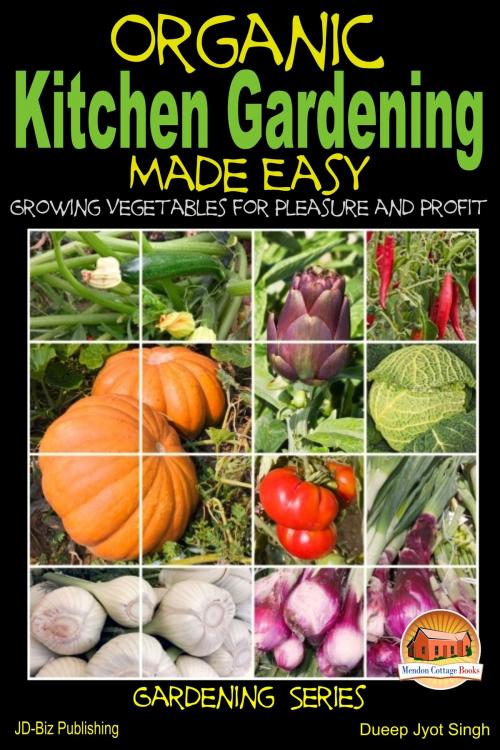Organic Kitchen Gardening Made Easy: Growing Vegetables for Pleasure and Profit
Nonfiction, Home & Garden, Gardening, Organic| Author: | Dueep J. Singh | ISBN: | 9781310673986 |
| Publisher: | Mendon Cottage Books | Publication: | February 11, 2015 |
| Imprint: | Smashwords Edition | Language: | English |
| Author: | Dueep J. Singh |
| ISBN: | 9781310673986 |
| Publisher: | Mendon Cottage Books |
| Publication: | February 11, 2015 |
| Imprint: | Smashwords Edition |
| Language: | English |
Table of Contents
Introduction
Let Nature Decide for You
Permanent Crops
Catch Crops
Annual Crops
Manure and Crops
Crop Rotation
Why Go in for Crop Rotation
4 Course Rotation
3 Course Rotation
Tuberous Crops
Potatoes
Soil
Sprouting
General Potato Cultivation
Best Organic Manure
Storing Potatoes
Root Crops
Carrots
Soil
Using Seed Drills
Cultivation of Carrots
Beetroot
Parsnips
Turnips
Tips for Sowing Seeds
Permanent crops
Growing Herbs
Growing through Cuttings
Appendix
Natural Manure
Types of Fertilizers
Conclusion
Author Bio
Publisher
Introduction
Voltaire once said “Happy is the man who has his own garden and true contentment is when he grows things in it.”
Having your own garden may not be possible for many of us today busy in the rat race of the 21st century. Nevertheless, there are still many people fortunate enough to have open land outside their houses where they can make their own flower gardens or kitchen gardens.
This book is going to tell you how to make an organic kitchen garden for pleasure and also for profit. Just like any other garden, a little bit of planning has to go into making your vegetable garden. It should have sufficient paths in it so that you can wheel about manures etc. in barrows, if necessary. You may also want to remove all the green vegetal rubbish accumulating while gardening.
There is absolutely no need for your garden to be all paths if it is pocket-sized and you are strapped for space. In small gardens one path at one side is more than enough.
Whatever the size of your organic vegetable garden may be, this book is going back to traditional methods of growing vegetables in a healthy manner. We are not talking about chemical fertilizers and poisonous pesticides. Instead, we are going to talk about natural manure, compost, and other traditional methods used by our forefathers to get a good healthy crop for family and neighbors.
Many people out there would not want to grow all kinds of vegetables because hey, how many of us like eating greens? But then the moment we see them growing in our gardens and we pluck our first harvest, we begin to think in terms of healthy eating, especially when the meals have been made of organic vegetables grown in our own backyard.
Your main priority is to see that the ground is fully occupied for most of the year and that no part of your garden is wasted. Think Japanese gardens. They know how to utilize every single inch of space and get the most out of it. All right, you may see their gardens on a small scale, but no inch of soil in a farm is left uncultivated if they can help it. This may look crowded, but it is not. So let us consider ourselves gardening newbies and begin our journey towards achieving the goal of the perfect long-term organic vegetable kitchen garden right now.
Remember that your kitchen garden is not going to be restricted to just vegetables. You can also grow herbs in it. Who is stopping you from growing flowers in it? Your aim is to plan your kitchen garden in such a way that you gain lots of pleasure from it, and then you may decide to carry on to the profit stage.
Table of Contents
Introduction
Let Nature Decide for You
Permanent Crops
Catch Crops
Annual Crops
Manure and Crops
Crop Rotation
Why Go in for Crop Rotation
4 Course Rotation
3 Course Rotation
Tuberous Crops
Potatoes
Soil
Sprouting
General Potato Cultivation
Best Organic Manure
Storing Potatoes
Root Crops
Carrots
Soil
Using Seed Drills
Cultivation of Carrots
Beetroot
Parsnips
Turnips
Tips for Sowing Seeds
Permanent crops
Growing Herbs
Growing through Cuttings
Appendix
Natural Manure
Types of Fertilizers
Conclusion
Author Bio
Publisher
Introduction
Voltaire once said “Happy is the man who has his own garden and true contentment is when he grows things in it.”
Having your own garden may not be possible for many of us today busy in the rat race of the 21st century. Nevertheless, there are still many people fortunate enough to have open land outside their houses where they can make their own flower gardens or kitchen gardens.
This book is going to tell you how to make an organic kitchen garden for pleasure and also for profit. Just like any other garden, a little bit of planning has to go into making your vegetable garden. It should have sufficient paths in it so that you can wheel about manures etc. in barrows, if necessary. You may also want to remove all the green vegetal rubbish accumulating while gardening.
There is absolutely no need for your garden to be all paths if it is pocket-sized and you are strapped for space. In small gardens one path at one side is more than enough.
Whatever the size of your organic vegetable garden may be, this book is going back to traditional methods of growing vegetables in a healthy manner. We are not talking about chemical fertilizers and poisonous pesticides. Instead, we are going to talk about natural manure, compost, and other traditional methods used by our forefathers to get a good healthy crop for family and neighbors.
Many people out there would not want to grow all kinds of vegetables because hey, how many of us like eating greens? But then the moment we see them growing in our gardens and we pluck our first harvest, we begin to think in terms of healthy eating, especially when the meals have been made of organic vegetables grown in our own backyard.
Your main priority is to see that the ground is fully occupied for most of the year and that no part of your garden is wasted. Think Japanese gardens. They know how to utilize every single inch of space and get the most out of it. All right, you may see their gardens on a small scale, but no inch of soil in a farm is left uncultivated if they can help it. This may look crowded, but it is not. So let us consider ourselves gardening newbies and begin our journey towards achieving the goal of the perfect long-term organic vegetable kitchen garden right now.
Remember that your kitchen garden is not going to be restricted to just vegetables. You can also grow herbs in it. Who is stopping you from growing flowers in it? Your aim is to plan your kitchen garden in such a way that you gain lots of pleasure from it, and then you may decide to carry on to the profit stage.















